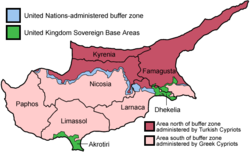United Nations Peacekeeping Force in Cyprus
[3] Major General Erdenebat Batsuuri (Mongolia) is the current Force Commander of UNFICYP, appointed in 2024, and preceded by Ingrid Gjerde (Norway).Initially, UNFICYP consisted of military and civilian contingents drawn from Australia, Austria, Canada, Denmark, Finland, Ireland, New Zealand, Sweden, and the United Kingdom.However, over its long history the Force has been the subject of various UNSC resolutions and reorganisations, and currently comprises contingents from Argentina, Australia, Austria, Bangladesh, Bosnia-Herzegovina, Brazil, Canada, Chile, Finland, Germany, Ghana, Hungary, India, Indonesia, Ireland, Italy, Jordan, Mongolia, Montenegro, Nepal, the Netherlands, Pakistan, Paraguay, Serbia, Slovakia, Romania, Russia, and the United Kingdom.On 5 December 2006, the United Nations Secretary-General Kofi Annan recommended a further six-month extension in the mandate of the UN mission that has been deployed on the island for over four decades.Mr. Annan said that while the situation remained "calm and stable with no major violations of the ceasefire lines," he regretted the continued stalemate in the political process and the "missed opportunities" over the past 10 years.With Denmark, Ireland and Finland, Canada was one of the four original contributors of troops to UNFICYP, committed by the government of Prime Minister Lester B. Pearson on 12 March 1964.The 858 military personnel are from Argentina, Austria, Brazil, Canada, Chile, China, Croatia, Hungary, Paraguay, Peru, Serbia,[11] Slovakia and the United Kingdom.There are 69 civilian police officers supplied by Brazil, Bosnia and Herzegovina, Jordan, Indonesia, Ireland, Italy, Germany, Montenegro, the Netherlands.[citation needed] Turkish forces built a barrier on the zone's northern side, consisting mainly of barbed-wire fencing, concrete wall segments, watchtowers, anti-tank ditches, and minefields.







Peacekeeping forceBlue Beret CampNicosia International AirportDepartment of Peace OperationsUnited Nations Peacekeeping ForceUnited Nations Security Council Resolution 186intercommunal violenceGreek CypriotsTurkish CypriotsIngrid GjerdeArgentinaAustraliaAustriaBangladeshBosnia-HerzegovinaBrazilCanadaFinlandGermanyHungaryIndonesiaIrelandJordanMongoliaMontenegroNetherlandsPakistanParaguaySerbiaSlovakiaRomaniaRussiaUnited KingdomCyprus disputeCyprus peace processEstablishmentUNSC resolution 355Annan Plan for CyprusUNSC resolution 1250referendums2008–2012 talks2014 talks2015–2017 talksStatus of Northern CyprusHuman rights in CyprusNorthern CyprusRefugeesUN representativeTurkish settlersGuaranteesElectricity supplyBuffer zoneKofi Annan as envoyUnited NationsUnited Cyprus RepublicTwo-state solutionConfidence BuildingCivil Society Dialogue1974 Greek Cypriot coup d'étatTurkish invasion of CyprusUnited Nations Security CouncilUnited Nations Buffer Zone in CyprusSpecial Representative of the Secretary-GeneralKofi Annanabandoned airportNicosiacivil districtsPaphos DistrictNicosia DistrictLimassol DistrictLarnaka DistrictKyrenia DistrictFamagusta DistrictUnited Nations Emergency ForceYom Kippur WarPrime MinisterLester B. PearsonFerret scout carsHMCS BonaventureArgentineArgentine military forcesArgentine ArmyArgentine MarinesCroatiaKokkina exclaveSan MartinOperation TOSCAKaimakliRoyal Military PoliceAlvis Tacticageneral-purpose machine gunsBell 212Argentine Air ForceHughes 5002006 Israel-Lebanon conflictFuad Siniorademilitarised zoneGovernment of CyprusSovereign Base AreasAthienouSovereign Base AreaOperation Atillainvoluntary parkUNFICYPCyprusTurkeyCovid-19de factoMustafa AkinciTurkish Republic of Northern Cyprusthe northErsin TatarBrahimiReportTahsin ErtuğruloğluCypriot refugeesRepublic of CyprusUnited Nations High Commissioner for Refugees Representation in CyprusPen & Sword MilitaryMarie Louise Stig SørensenNorwegian Institute of International AffairsSecretary-GeneralAntónio GuterresDeputy Secretary-GeneralAmina J. MohammedGeneral Assembly President